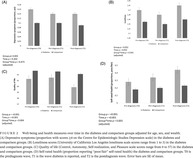- Record: found
- Abstract: found
- Article: found
The impact of a diabetes diagnosis on health and well‐being: Findings from the English Longitudinal Study of Ageing

Read this article at
Abstract
Background
Poorer health and well‐being are associated with diabetes risk. However, little is known about the trajectory of health and well‐being from before to after diabetes diagnosis. We compared depressive symptoms, quality of life, self‐rated health, and loneliness at three time points (prediagnosis, diagnosis, 2–4 years post diagnosis) in individuals who developed diabetes and a comparison group.
Methods
Health and well‐being measures were self‐reported by 3474 participants from the English Longitudinal Study of Ageing. Repeated measures analysis of variance and generalized estimating equations were used to investigate differences by group, time, and group‐by‐time interactions.
Results
A total of 473 (13.6%) participants developed diabetes. The diabetes group reported greater depressive symptoms ( W 2 (1) = 20.67, p < .001) and lower quality of life ( F = 1, 2535 = 10.30, p = .001) and were more likely to rate their health as fair/poor ( W 2 (1) = 67.11, p < .001) across time points, adjusting for age, sex, and wealth. They also reported greater loneliness ( F = 1, 2693 = 9.70, p = .002) in unadjusted analyses. However, this was attenuated to the null in adjusted analyses. The group‐by‐time interaction was significant for quality of life ( F = 1.97, 5003.58 = 5.60, p = .004) and self‐rated health ( W 2 (2) = 11.69, p = .003), with a greater decline in these measures over time in the diabetes group in adjusted analyses.
Conclusion
People who received a diabetes diagnosis had greater depressive symptoms, lower quality of life, and poorer self‐rated health than those who did not develop diabetes. Quality of life and self‐rated health deteriorated more rapidly following a diagnosis. Screening for these factors around the time of diagnosis could allow for interventions to improve the health and well‐being of those with diabetes.
Abstract
Highlights
-
People who develop diabetes report greater depressive symptoms and lower quality of life and rate their health as poorer than those who do not develop diabetes.
-
Around the time of diagnosis, people with diabetes experience a greater decline in quality of life and self‐rated health than adults who do not develop the condition.
Related collections
Most cited references45
- Record: found
- Abstract: not found
- Article: not found
The MOS 36-ltem Short-Form Health Survey (SF-36)
- Record: found
- Abstract: found
- Article: found
Cohort profile: the English longitudinal study of ageing.
- Record: found
- Abstract: found
- Article: not found

